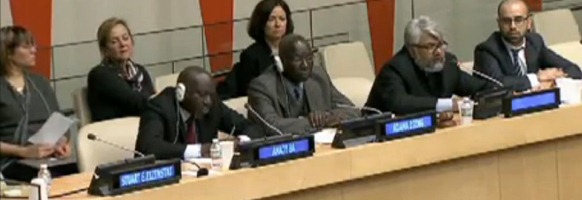United Nation’s Special Advisor on Prevention of Genocide to the Secretary General (SG), Adama Dieng, said during a UN panel discussion Wednesday that not only the United Nations but all member states failed the people of Sri Lanka. He implied that while the SG did not make use of Article 99 which bestows power on the SG to refer to the Security Council situations that threatened international security, the SG set up panels to identify witnesses and has now set up the "Rights Up Front plan," which might have prevented the situation [killings] in Sri Lanka. Meanwhile, Amady Ba, the Deputy Prosecutor to the International Criminal Court, referring to the killings, said that the ICC has no jurisdiction over countries that are not party to the Rome Statute.
Adama Dieng responds
The Genocide panel discussion was moderated by Mr. Tunku Varadarajan, a Research Fellow at Stanford University’s Hoover Institution. Mr. Amady Ba represented Mrs. Fatou Bensouda, the Prosecutor of the ICC who couldn’t attend the event.
In the videos, Amady Ba and Adma Dieng were responding to the following question from the audience:
Amady Ba of ICC responds
"Could each speaker explain their perspective on handling difficult situations such as a precursor to what happened in Syria namely Sri Lanka, where allegations of war crimes, crimes against humanity and genocide have been raised continuously since the end of armed conflict in 2009, but Sri Lanka is not a party to the Rome Statute and the UN Security Council has been polarized politically (just like Mr. Haid said) whenever the situation of Sri Lanka is raised? Meanwhile, UN High Commissioner for Human Rights Navi Pillay has reported that continuing impunity for Sri Lanka’s atrocities in 2009 has enabled further deterioration in the situation -economic, social, cultural, personal security- of the Tamil and Muslim communities. What options for recourse and justice do Tamil victims have in situations like Sri Lanka, and how can issues of international justice and accountability be de-politicized (as many of you have questioned) to truly end impunity? Specifically with regards to Mr. Ba (reprentative member of ICC) — can the prosecutor’s propio motu powers be used against Sri Lanka?" and could the Secretary-General use Article 99 to take action to protect the Tamil community on the island?
 UN Genocide panel answering questions
UN Genocide panel answering questions
Amady Ba refers to the "Proprio motu" power which is used to refer to a decision by the Prosecutor of the International Criminal Court to initiate an investigation into a situation without a referral from the Security Council or a State Party; this power is granted by article 15(1) of the Rome Statute.
Ba says the Prosecutor is helpless since Sri Lanka is not a party to the Rome Statute. In an earlier CNN interview, the former ICC Prosecutor, O’Campo also said the same.
On 17 July 2012, Secretary-General Ban Ki-moon announced the appointment of Adama Dieng of Senegal as Special Adviser on the Prevention of Genocide. Mr. Dieng has served as Registrar of the International Criminal Tribunal for Rwanda since 2001. He began his career as Registrar of the Regional and Labour Courts in Senegal, and served as Registrar of the Supreme Court of Senegal for six years. From 1982 to 2001, Mr. Dieng worked for the International Commission of Jurists, for the last ten years as the organisation’s Secretary-General. During this period he was appointed as Envoy of the United Nations Secretary General to Malawi in 1993, and as the United Nations Independent Expert for Haiti from 1995 to 2000.
(For updates you can share with your friends, follow TNN on Facebook and Twitter )
